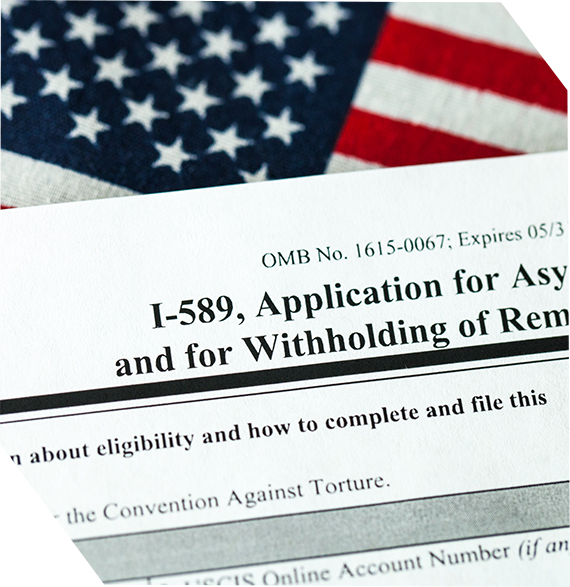
Family Petitions
Immigrant Visas that lead to Permanent Residency via consular processing or as an adjustment of status, these procedures could be conducted inside and outside the United States.
The following family members qualify for an immigrant visa that culminates in permanent residence.
Immediate Categories (An immediately available visa)
Spouse of a U.S. Citizen
Father or Mother of Child 21 years of age or older U.S. Citizen
Child under the age of 21 of a U.S. Citizen Parent
Preferred Categories (Visa is available when the priority date is reached according to the Department of State visa bulletin)
Unmarried sons and daughters (21 years of age and older) of U.S. citizens.
Spouses and children (unmarried and under 21 years of age) of lawful permanent residents.
Unmarried sons and daughters (21 years of age and older) of lawful permanent residents.
Married sons and daughters of U.S. citizens.
Brothers and sisters of U.S. citizens (if the U.S. citizen is 21 years of age and older).
The definitions of parent and child include stepparents and stepchildren with certain restrictions.
Other cases that may result in permanent residence are:
The fiance of a citizen
Widows and widowers of citizens

Immigration Court
The U.S. government files charges for deportation or removal of a noncitizen for one of the following grounds during an administrative procedure in immigration court:
1) for being unauthorized in the United States.
2) violating a law or rule that revokes previously granted lawful status.
To prevent removal or deportation and maintain legal status in the United States, the following defenses or remedies may be brought up in immigration court:
Adjustment of Status
Cancellation of Removal or Deportation for Permanent Residents
Cancellation of Removal for Non-Residents
Waivers
Asylum, Withholding of Removal, and Remedies under the Convention Against Torture Custody Redetermination (Bond)
The noncitizen has three rights in immigration court: (1) the right to be represented by counsel (the government does not offer or fund this service); (2) the right to a hearing; and (3) the right to an interpreter.

Appeals
You can appeal to the Board of Immigration Appeals if the immigration court rules unfavorably in your case. The appeal is a legal brief that outlines the flaws in the immigration court’s ruling and the legal justifications for why you should win your case.

U Visa
Victims of certain qualifying crimes, such as torture, rape, human trafficking, domestic abuse, incest, sexual assault, slave trade, false imprisonment, extortion, murder, or kidnapping, may be eligible for this four-year temporary visa. Crime victims who have experience bodily or psychological injury must cooperate with law enforcement authorities in their investigations and criminal prosecutions. U-Visa derivatives can include spouses, young children, and sporadically siblings. The victim of a crime may apply for permanent residency after issuing a U-Visa and after three years. The U Visa’s approval may also help to delay or halt the criminal victim’s removal or deportation procedures.

T Visa
People who have experience human trafficking and are ready to cooperate with an inquiry into the trade or a connected crime are eligible for the T visa. People with a T visa can live and work in the United States. The T visa holder’s spouse, kids, and other family members may seek status on that basis.

Violence Against Women Act (VAWA)
Under VAWA, a victim of domestic violence who is the spouse, ex-spouse, child, or parent of a citizen or legal permanent resident of the United States may “self-petition” for lawful permanent residence without the abuser’s consent. If you are divorced, and your marriage to the abusive spouse ended within two years, you may also file a self-petition

Asylum
A person who departs their country of origin enters or attempts to enter the United States and claims asylum to benefit from American protection and avoid returning to their country of origin.
You must demonstrate that you are a refugee who is unable or unwilling to return to your country of origin due to persecution or a well-founded fear of persecution due to your race, religion, nationality, membership in a particular social group, or political opinion to be eligible for asylum.
This implies that you must demonstrate that your persecution or fear of persecution stems primarily from your race, religion, nationality, membership in a specific social group, or political viewpoint. Economic hardship is not an acceptable justification for seeking refuge.
You have a year after entering the country to submit an asylum application.
You may apply with USCIS for Affirmative Asylum if you already live in the US and preferably have some provisional immigration status. If immigration officers apprehend you at or around the port of entry and you claim fear of persecution, you may apply for Defensive Asylum with the Immigration Court.

Naturalization And Citizenship
Naturalization is the process by which U.S. citizenship is granted to a lawful permanent resident after meeting some requirements. Candidates for this voluntary procedure must be at least 18 years old and have lived in the United States as a permanent resident for at least five years (or three years if the person is married to a U.S. citizen). If a person has served in the US military, the criterion of permanent residence may be waived.
The applicant for naturalization must have a good moral character and be able to read, write and speak basic English. During the interview, the immigration officer will ask ten questions from one hundred, and the applicant should answer six correctly. Also, the applicant should write and read a simple English sentence.
Acquisition of citizenship is obtained through U.S. citizenship parents either at birth or after birth, but before the age of 18. The law in effect at the time of birth determines whether someone born outside the United States to a U.S. citizen parent (or parents) is a U.S. citizen at birth. In general, these laws require that at least one parent was a U.S. citizen and that the U.S. citizen parent had lived in the United States for some time.
A child born outside the U.S. but now lives in the U.S. may acquire citizenship if at least one parent is a U.S. citizen by birth or through naturalization; is under 18 of age; is a lawful permanent resident; and is residing in the US under the custody of the U.S. citizen parent.
